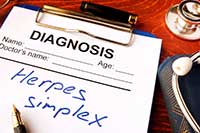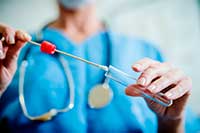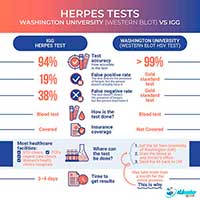How is herpes tested?
Here, we will describe how different herpes tests [1] Screening for Genital Herpes https://www.cdc.gov/herpes/testing/index.html are performed and what to expect during the test.
Before the test
No special preparation is required for a blood or swab test.
During the test
✓ A specimen is collected for a swab test by rubbing a sterile swab against the sore or sometimes by popping a blister or scraping its base with a scalpel.
✓ For a herpes blood test, a small blood sample is taken from the vein using a small needle.
After the test
There are no post-test restrictions with blood and swab tests.
✓ A swab test might cause slight temporary discomfort afterward.
✓ A blood test might cause minimal soreness and bruising that is typically short-lived.
Normal results
A negative or normal herpes test means the virus sign could not be found in the tested sample.
Does it mean you do not have herpes? Yes and no. The answer is a bit complicated and depends on the testing type that was done and the timing of those tests.
If the blood work was done and no antibody test [2] Genital Herpes https://www.acog.org/womens-health/faqs/genital-herpes was not seen, you must know that the body might take up to 3 months to produce antibodies. So, if it is done too soon, the results can be false negatives.
If the swab test had been performed, it should have been performed when the blister broke, and the virus concentration in the fluid was still high. The test can give false negative results if the sores are already formed, especially crusted and dry.
What does an abnormal herpes test mean?
An abnormal or positive herpes test means a sign is detected in the tested sample.
Again, as with negative tests, the reliability of the positive herpes test depends on the test types performed.
If the swab test shows the herpes positive test, it is accurate and reliable. It confirms that the skin lesion is caused by herpes and confirms active infection.
If the blood test is positive, there is a 20% of a false positive result. In addition, positive herpes blood tests cannot differentiate between recent and past infections.
Why does the CDC not recommend herpes testing?
These are the reasons why the CDC is not advising the test (and we, as practicing physicians, agree with them)
- Early diagnosis will not change the disease prognosis.
Usually, screening tests are recommended when there is a high chance of a better outcome if a condition is diagnosed earlier. This is not the case with herpes. Herpes is a lifelong infection, and there is no change in treatment strategy or prognosis if someone is diagnosed early. - Testing will not change sexual behavior.
According to multiple studies, there is no proof of a herpes-positive person changing their sexual behavior after learning about their herpes status. - Testing will decrease quality of life.
Once an asymptomatic person gets a positive result, they may start to feel stigmatized and ashamed, which will significantly lower their quality of life. - Testing will not reduce the chance of HIV acquisition.
Though herpes increases the chance of HIV acquisition, early herpes diagnosis and treatment will not help to lower this risk (based on a few studies). - There is a high chance of a false-positive result.
There is always a chance (up to 20%) of having false-positive test results [3] Herpes Simplex Virus (HSV) Infections https://www.merckmanuals.com/home/infections/herpesvirus-infections/herpes-simplex-virus-hsv-infections (that is, the test indicates the presence of infection, but a person does not have it). This may lead to unnecessary financial and psychological issues.
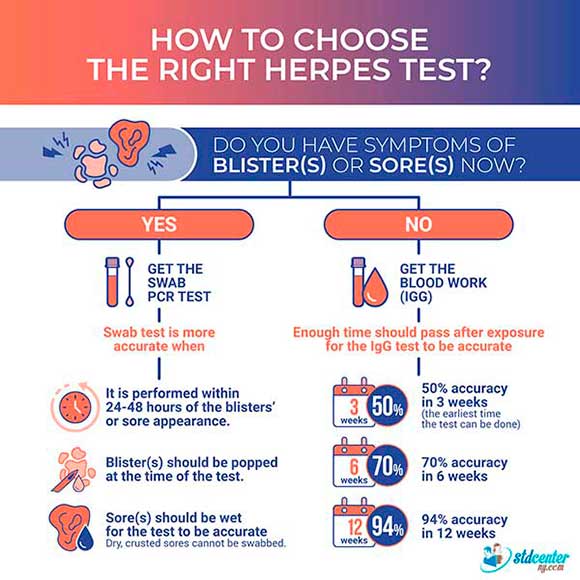
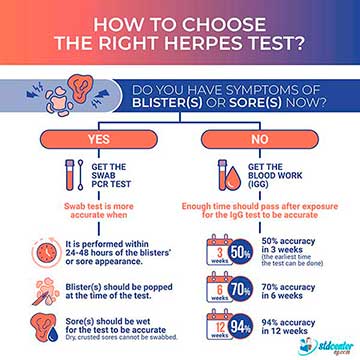
FAQ
Do most people test positive for herpes? ›
Is a herpes test performed when I ask to get tested for all STDs? ›
Can you test for herpes without an outbreak? ›
I had an outbreak but tested negative. How is it possible? ›
More details on herpes testing
Herpes tests accuracy
Written and reviewed by Slava Fuzayloff M.D.
IgG herpes test
Written and reviewed by Slava Fuzayloff M.D.
Herpes swab test
Written and reviewed by Slava Fuzayloff M.D.
Washington University herpes test
Written and reviewed by Slava Fuzayloff M.D.
Source
-
Screening for Genital Herpes
https://www.cdc.gov/herpes/testing/index.html -
Genital Herpes
https://www.acog.org/womens-health/faqs/genital-herpes -
Herpes Simplex Virus (HSV) Infections
https://www.merckmanuals.com/home/infections/herpesvirus-infections/herpes-simplex-virus-hsv-infections -
Herpes Tests
https://patient.uwhealth.org/healthwise/article/en-us/hw264763 -
Genital herpes
https://www.womenshealth.gov/a-z-topics/genital-herpes
